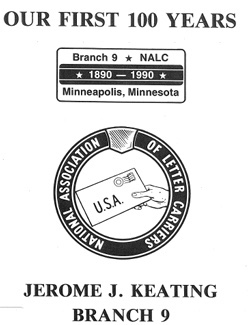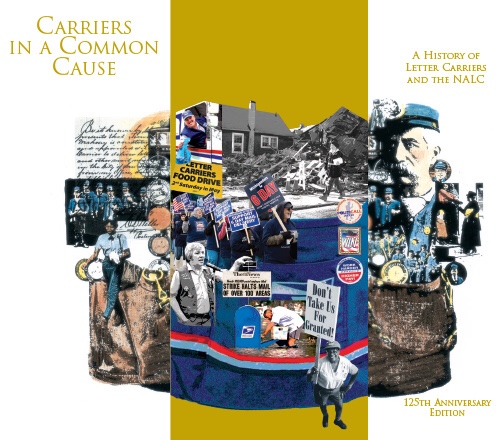
Thirty-five years of struggle
A Brief History of Collective Bargaining:
1971-2006 Postal employees, unlike the vast majority of federal employees, enjoy the right to negotiate directly with their employing agency over pay and benefit issues. This right is provided by the Postal Reorganization Act (PRA) of 1970. That law, in turn, came about because of the courage of letter carriers and other postal employees who staged an illegal strike in 1970 to protest years of inadequate pay and steadily worsening working conditions. The strike settlement tied significant pay increases to the enactment of postal reform legislation, which was passed in August, 1970.
The 1970 law created the United States Postal Service as an independent agency of the Federal government to succeed the then 195-year old Post Office Department, which had been a Cabinet-level agency for much of its history. It also granted the USPS operational autonomy and placed it on a path to financial self sufficiency (the USPS has not received any taxpayer subsidies since 1982). Most importantly for NALC members, the legislation granted letter carriers and other postal employees collective bargaining rights. Indeed, with the notable exception of the right to strike, postal employees were given the same rights as workers in the private sector provided by the National Labor Relations Act.
If negotiations fail to result in an agreement, the PRA sets out a timetable for dispute resolution that includes mediation, fact-finding and, if necessary, binding interest arbitration. In interest arbitration, the union and postal management each appoint an arbitrator who work together with a neutral arbitrator (who is appointed by mutual agreement or selected by the Federal Mediation and Conciliation Service) to fashion a new contract (issued through an “award” of the panel) after hearing testimony and considering evidence submitted by both sides. Although the law establishes specific time frames for fact-finding and arbitration, the parties often mutually agree to waive these time frames and the process often goes on for extended periods of time.
Over the past 35 years, the NALC and the Postal Service have been parties to 11 labor contracts. Six have been negotiated voluntarily, four have been arbitrated and one was partially arbitrated. The length of each contract, which itself can become a major issue in the negotiating process, has varied from two to five years.
The first contract in 1971 was negotiated by a Joint Bargaining Committee comprised of all the postal unions that existed at that time, including the NALC. Over the next 20 years, the NALC bargained in concert with one or more of its sister unions in each round of bargaining. However, in 1994, delegates to the Atlanta City Convention instructed the NALC’s leadership to negotiate on its own for the first time. That decision paid off in 1998 when NALC won an historic interest arbitration award which upgraded the pay of all city letter carriers (beyond the COLAs and general wage increases of a typical contract).
Although the most recent contract (2001-2006) resulted from a voluntary and mutually acceptable agreement, the prior three contracts (covering 1990-1994, 1994-1998 and 1998-2001) resulted from binding arbitrations. The main stumbling block in all three cases was the issue of pay comparability, a policy standard applied to the Postal Service in the PRA that requires the Postal Service to strive to compensate its employees with pay and benefits similar to that offered for “comparable levels of work in the private sector.” Throughout the 1990s, the Postal Service returned to an argument it first made in the 1984 round of negotiations: Letter carriers, it maintained, were overpaid.
NALC firmly and successfully resisted this argument and has repeatedly fought off demands for pay freezes, givebacks and benefit cuts. Although two arbitration panels (the Kerr panel in 1984 and the Mittenthal panel in 1991) have called for a policy of “moderate restraint” in pay raises for postal employees in general, no interest arbitration panel has ever concluded that letter carriers are overpaid. Since the NALC began negotiating on its own in 1994, two interest arbitration panels have rejected the Postal Service’s contention that city letter carriers enjoy a “wage premium.” In both cases, NALC clearly demonstrated that city letter carriers earn wages that are comparable to those paid by other national delivery companies and that “comparable levels of work” is a much more complicated concept than the Postal Service maintains.
NALC strongly prefers to negotiate agreements that are mutually acceptable to its members and postal management. Such agreements are sent out to the members for ratification and give our members the final say. They are also fair to postal management and the Postal Service’s customers.
The 2001-2006 National Agreement was such an agreement. It was ratified by a margin of greater than 7 to 1. It was a good deal for letter carriers and for the Postal Service and its customers. Over the period of the contract, the USPS added 4.7 million new city delivery points to its daily delivery network and boosted total mail volume by 4.2 billion pieces annually while the number of city carriers dropped by 6.3 percent. These efficiency gains contributed to profits of $9.3 billion over the past three years, which allowed the USPS to entirely eliminate its outstanding debt for the first time in its history. All the while, postage rates remain highly affordable.
The long period of stability provided by the current five-year contract was also essential during a period of significant challenges to the Postal Service. These included the terrorist attacks of 2001 and the hurricanes of 2005. NALC and the USPS also used the time to significantly improve the quality of labor relations by implementing a new Dispute Resolution Process that has slashed outstanding grievances dramatically.
NALC looks forward to negotiating a new National Agreement. Under the leadership of NALC President William H. Young, the union is committed to achieving a win-win settlement that is fair to the nation’s letter carriers and to the Postal Service’s millions of customers.

